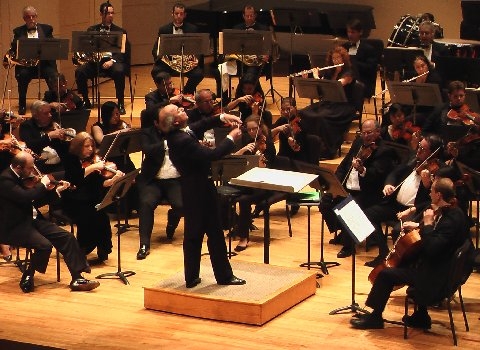Miami Symphony brassy and boisterous in amply American program
 The Miami Symphony’s three-hour marathon, titled “Made in America,” was, in its way, a microcosm of the nation: sprawling, ambitious and wildly diverse, with elements that failed to cohere amid the evening’s successes.
The Miami Symphony’s three-hour marathon, titled “Made in America,” was, in its way, a microcosm of the nation: sprawling, ambitious and wildly diverse, with elements that failed to cohere amid the evening’s successes.
The good news is that under Eduardo Marturet’s leadership, the Miami Symphony Orchestra has markedly improved in technical gleam and quality of musicianship to the point where clean ensemble is not a one-off fluke. The charismatic Venezuelan conductor led a high-voltage performance of Dvorak’s Symphony No. 9 Sunday night at the Lincoln Theatre that proved an apt showcase for the MSO’s lustrous violins and vastly upgraded horns. Marturet could have reined in the trumpets more firmly and there’s still work to be done with the violas and some of the winds, but this was by any account, an exciting, if boisterous performance.
The Miami Symphony’s effort at bridge-building beyond its traditional Latin audience is evident in its burgeoning association with the University of Miami’s Frost School of Music. The MSO and Frost School recently unveiled a partnership in which a Frost teaching assistant will serve as the Miami Symphony’s assistant conductor for two years. Christian Grasses, currently completing his doctorate, is the first conductor to be selected, and was on the podium for the evening’s centerpiece featuring—who else?—the Frost’s peripatetic dean, jazz pianist Shelly Berg.
 The “jazz dean” has stated that he doesn’t believe in dividing music by category, and as a classically trained pianist who performs jazz, Berg surely embodies that eclectic genre-crossing philosophy. There is no denying Berg’s jazz chops, and, along with his hyperkinetic stage presence, the speed, dexterity and rhythmic ingenuity of his keyboard work was often remarkable Sunday night, with contributions by trio colleagues, bassist Gary Thomas and drummer Daniel Susnjar, on a solid if less flashy level.
The “jazz dean” has stated that he doesn’t believe in dividing music by category, and as a classically trained pianist who performs jazz, Berg surely embodies that eclectic genre-crossing philosophy. There is no denying Berg’s jazz chops, and, along with his hyperkinetic stage presence, the speed, dexterity and rhythmic ingenuity of his keyboard work was often remarkable Sunday night, with contributions by trio colleagues, bassist Gary Thomas and drummer Daniel Susnjar, on a solid if less flashy level.
Yet while Berg’s reputation as a jazz musician is secure, his arrangements illustrate the difficulties of mixing free-form improvisation with notated orchestral parts. Scored for large orchestra, the overblown symphonic backing to his jazz retooling of Paul McCartney’s Blackbird largely buries the simple lyricism of the original song. While Berg’s piano work was consistently inventive, the arrangement of Faure’s Pavane seemed even more over the top—complete with maracas—and the trumpet scoring made the delicate original sound like a banal Christmas carol.
Berg premiered his own Incandescent, Iridescent, Effervescent, which showed a somewhat more closely-knit unity between his frenzied extempore solo work and the orchestra. But here too, the Miami Symphony players were largely limited to empty vamping or sitting silently while the trio played, and the souped-up scoring sounded like a rather treacly brand of dated 1970s symphonic pop. Conductor Grasses did what he had to do skillfully, but it would be interesting to hear what he can accomplish with more substantial music.
 The evening led off with the Florida premiere of Joseph Schwantner’s Chasing Light, part of the admirable Ford Made in America program. The project enlists a leading U.S. composer to write a new composition that will then be performed by 58 smaller-budget American orchestras, ensembles that could never afford such a commission by themselves.
The evening led off with the Florida premiere of Joseph Schwantner’s Chasing Light, part of the admirable Ford Made in America program. The project enlists a leading U.S. composer to write a new composition that will then be performed by 58 smaller-budget American orchestras, ensembles that could never afford such a commission by themselves.
Inspired by the natural beauty of rural New Hampshire where Schwantner lives, Chasing Light opens with characteristic drive and percussion, kicked off by aggressive, asymmetric timpani and bass drum, music soon taken up by the full orchestra. The second section forms a peaceful contrast, with bucolic winds and cooling piano cascades like a flowing stream, which builds to a striding Copland-esque climax. More ominous passages return in the third section, and the finale recaps the preceding material, ending in a confident optimism.
Despite its quasi-ceremonial commission, Chasing Light is an inspired work, smartly scored, deftly varied, accessible yet not vacuous. The MSO under Marturet’s energetic direction gave Schwantner’s music an exuberant local premiere.
Posted in Performances
Leave a Comment
Mon Feb 9, 2009
at 2:45 pm
No Comments






